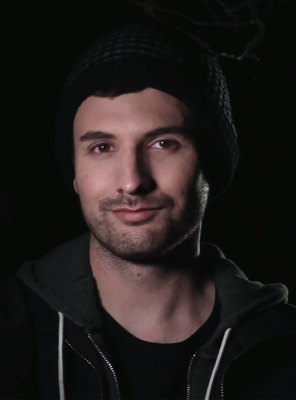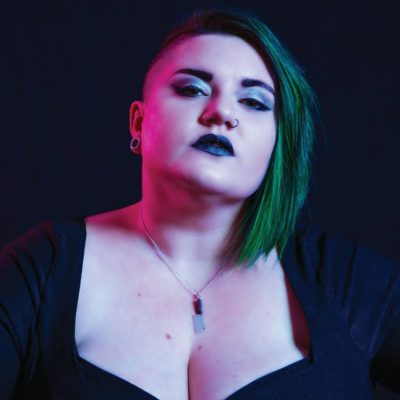 Name: BJ Colangelo
Name: BJ Colangelo
Age: 29
Birth Place: Winthrop Harbor, IL
Sexuality: Queer/Gay
Notable films: Margaret (2016), Powerbomb (2018), Deathcember (2019), Labrys (2019)
When did you know you were queer? When did you come out?
BJ Colangelo: The truth is that I knew when I was about five-years-old. I had fallen in love (the way only a kindergartener can) with a girl in my class. We kissed on the playground and when the teacher told our parents, she was sent away to Catholic School. (She IS gay, by the way; we reconnected in College)
However, I was raised in a community with very well known parents (my dad was a politician). We were always in the public eye and I was afraid that my sexuality was going to ruin my father’s career, so I desperately tried to convince myself that I wasn’t gay. I had relationships with women in private all throughout my life, but it wasn’t until my college years that I tip-toed out of the closet and just recently finally began to publicly live my truth. There is no wrong way for someone to come to terms with their sexuality.
In the last five or so years, you’ve really become a bit of a multi-hyphenate (writer, actor, director, producer). How did you get into filmmaking?
BJC: Filmmaking is something that I never knew that I had the option to pursue. As a woman, I was socially conditioned to believe that filmmaking wasn’t meant for someone like me. It wasn’t until I met my Powerbomb co-director, Zach Shildwachter, that someone finally told me, “there’s no reason you can’t make movies. Do it.”
I know you’ve branched out with Powerbomb most recently, but most of your filmmaking career is tied to horror. What is it about horror that keeps you coming back?
BJC: Horror has always been my lifeblood for as long as I can remember. I spent a decade analyzing and critiquing horror films, and it’s where my brain likes to live. Powerbomb is more of a character study/thriller, but there are elements of horror littered throughout. Fear is a universal emotion, but what makes us afraid is different for every person. I’m fascinated by figuring out what impacts us as a whole, and how can I bring that to screen.
What films (queer or not) have made a significant impact on you and your work? In what way?
BJC: I have worshipped at the altar of John Waters for as long as I can remember. His punk-rock/DIY/take no shit attitude in all of his films is awe-inspiring. Waters tells stories that he wants to tell, he tells them in his way, and never sacrifices his creativity or style in the process. He casts “non-traditional” actors and doesn’t give a single fuck what anyone thinks of him. If I can capture even a fraction of that energy, I’ll consider my career a success.
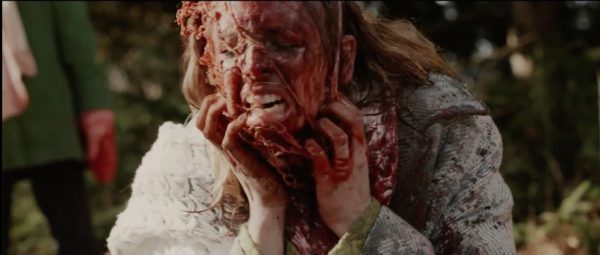
“They Used To Laugh and Call Him Names” from Deathcember
You’re working out of Cleveland, which is rare compared to a lot of other directors situated in Hollywood. Does that present its own challenges? How progressive or welcoming is the industry (Cleveland or more broadly speaking) for queer creators right now?
BJC: Working in Cleveland has its benefits because it is exponentially cheaper to work here than anywhere else. Cost of living is laughably affordable compared to places like New York or Los Angeles. Rental fees, props, locations, costumes, craft services, etc…all of these things can be done on a shoestring budget.
As far as the progressive/welcoming environment…it really depends. Ohio is still a swing state and still has a Republican controlled congress. There aren’t statewide protections for LGBTQ+ folk and although Cleveland is one of the progressive bubbles in the state…it’s still Ohio. Less than three months after shooting a queer horror short film at a bar where I work, we were harassed by a religious right extremist group in the parking lot. I’ve been fortunate to find a community of creatives that I can depend on and come from affirming belief systems, and I refuse to let them go.
Several of your shorts have strong feminist and socially progressive themes. Do you believe that your sexuality informs your films?
BJC: It absolutely informs my films. I’ve spent a lifetime watching films where I didn’t feel seen or they were told from a perspective that I’ve never experienced. The films I make are the stories I wish I had access to when I was younger.
Do you subscribe to queer readings of your films?
BJC: Absolutely. All of my films have queer themes, even the ones that aren’t overtly queer.
Have you interacted with many queer horror fans of your films? What has that experience been like?
BJC: I have! It’s always exciting to listen to people try and draw metaphors from my work to their own lived experiences. The greatest compliment, however, is when a queer actor gets to play a queer character and thanks me for allowing them to play a character they actually identify with. That always makes me feel good.
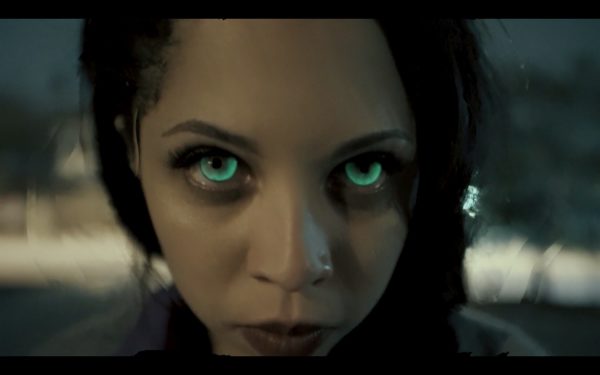
Labrys
You’re a very busy woman – you’re contributing a segment to the holiday anthology Deathcember and you’re shopping a mysterious queer horror short to festivals. What can you tell me about these projects?
BJC: I first and foremost have to thank Chelsea Stardust (All That We Destroy, Satanic Panic) for recommending Zach and I to the producers of Deathcember. We’re the only Midwest contributors of the American-based directors, and we shot our segment outdoors in 21-degree weather during an Ohio winter. Without giving away the plot, the title is “They Used To Laugh and Call Him Names.” I think that does a pretty good job at giving audiences an idea of what topic we’re tackling.
As far as my horror short, it’s called Labrys and it’s about a woman on her first date with another woman, and her journey to come to terms with who…and what she is. It was shot on a shoe-string budget, but I’m extremely proud of it. It’s Carrie meets X-Men on a lesbian first date.
Follow BJ on social media:
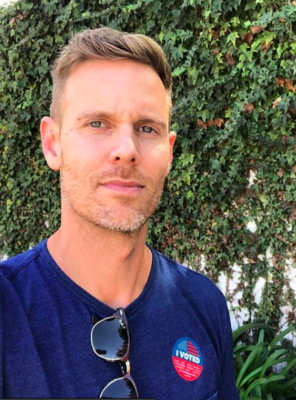 Name: Christopher Landon
Name: Christopher Landon